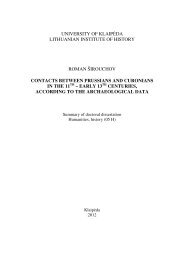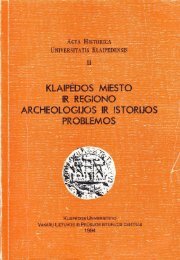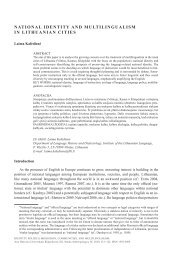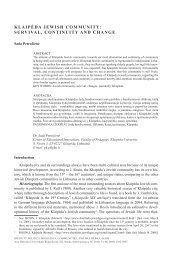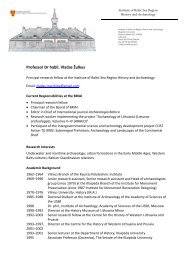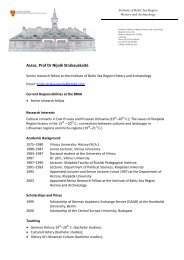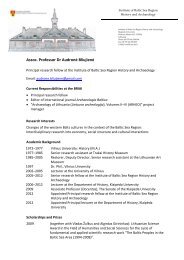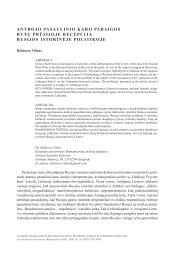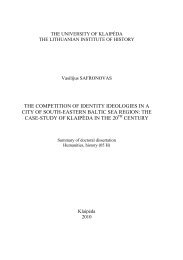See summary of dissertation in English - Baltijos regiono istorijos ir ...
See summary of dissertation in English - Baltijos regiono istorijos ir ...
See summary of dissertation in English - Baltijos regiono istorijos ir ...
Create successful ePaper yourself
Turn your PDF publications into a flip-book with our unique Google optimized e-Paper software.
ta<strong>in</strong> personnel category, which <strong>in</strong>cluded several groups characterised by<br />
different social status: 1) the workers ma<strong>in</strong>ta<strong>in</strong>ed by the manor –<br />
women, bernai (male helpers), mergos (female helpers) and shepherds –<br />
who neither had the<strong>ir</strong> implements <strong>of</strong> production nor household, and 2)<br />
parobkai, who constituted <strong>of</strong> the people <strong>of</strong> higher level <strong>in</strong> the familia.<br />
The ma<strong>in</strong>tenance <strong>of</strong> manorial livestock and corvée labour <strong>in</strong> the cultivation<br />
<strong>of</strong> arable land <strong>of</strong> the manor and other household activities were the<br />
ma<strong>in</strong> functions <strong>of</strong> the manorial familia. Familia was an open personnel<br />
category: people could h<strong>ir</strong>e themselves out to this group for longer or<br />
shorter periods (e.g. dur<strong>in</strong>g the labour season) and withdraw from it<br />
upon the change <strong>of</strong> marital status when they got married.<br />
The th<strong>ir</strong>d section Darž<strong>in</strong><strong>in</strong>kai focuses on the personnel group, which<br />
made up an <strong>in</strong>termediary group between the familia and bound peasants<br />
(ville<strong>in</strong>s). When the Wallach Reform was <strong>in</strong>troduced to the lands <strong>of</strong> the<br />
grand duke, the status <strong>of</strong> a part <strong>of</strong> the familia <strong>in</strong> ruler’s manors was<br />
turned <strong>in</strong>to darž<strong>in</strong><strong>in</strong>kai (literally – gardeners). Similar to the people who<br />
belonged to the familia, they owed the<strong>ir</strong> services to the manor.<br />
Darž<strong>in</strong><strong>in</strong>kai were given small strips <strong>of</strong> land situated at some distance<br />
from the manor. The <strong>in</strong>sufficient size <strong>of</strong> the<strong>ir</strong> land-plots could<br />
not ensure the<strong>ir</strong> existence. Therefore, the people belong<strong>in</strong>g to this personnel<br />
group used to engage <strong>in</strong> various other activities, for <strong>in</strong>stance,<br />
crafts, forest protection, etc. The analysis leads to the conclusion that<br />
the personnel model applied at the ruler’s manors was not <strong>in</strong>troduced<br />
to all private manors, though it is obvious that some tried not to lag<br />
beh<strong>in</strong>d as well. However, darž<strong>in</strong><strong>in</strong>kai are not that commonly found <strong>in</strong><br />
the manors and they existed <strong>in</strong> rather small groups only. It would be<br />
reasonable to th<strong>in</strong>k that there was no need to expand this social group<br />
<strong>of</strong> peasants.<br />
The fourth section – Peasants – provides the discussion on the group<br />
<strong>of</strong> peasants, which depended on the manor, and the services that they<br />
owed to it. To evaluate the relations ma<strong>in</strong>ta<strong>in</strong>ed between the peasants and<br />
the manor <strong>in</strong> the 16 th century, historians group them by the performance<br />
or non-performance <strong>of</strong> the<strong>ir</strong> services to the manor, or, to be more precise,<br />
personal dependence ties with the manor: whether they owed the services<br />
to the manor or they did not, or perhaps, they agreed to perform them by<br />
26





